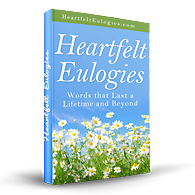After the passing of a loved one there is such a rush of emotions. Dealing with the loss of that loved one is not only difficult but can be traumatic, without having to stress over the eulogy. You might immediately think, oh my gosh this is going to be so difficult, I really cared about this person and we have had such good times and memories together, how am I going to squeeze a lifetime of experiences into a fifteen minute eulogy.
And that actually is quite a task but all is not lost, and this seemingly impossible task can be done. It is indeed possible with the right method. Remember you want to properly reflect the sparkle in this person’s life and the impact they made in yours.
When writing a eulogy, take your time and think about all the experiences that you shared together. Then think about the ones that best show the character of the deceased; his or hers’ funny sayings, memorable anecdotes, favorite poems and personal mottos.
Make a note of them, as this is what will most likely make it into your speech. Then, if your list of memories is too long, again cut down and retain the experiences that best reflect the nature of the person.
Now comes the fun part, actually writing the speech. Firstly you have to find out whether or not you are the only person giving a eulogy or will there be others and how much time do you have. This is important as it can define the message of the speech or add or cut down the time the speech is given, thus dictating the level of content. Choose the tone of the speech, comical, reverent or both.
Start by giving heartfelt greetings and salutations. Make sure that the grieving family is given a special mention. Also, in the opening portions of the speech you should take the time to introduce yourself. Because it is likely that everyone there might not be aware of whom you are.
Explain your connection to the deceased, how you met and let that flow into the other section of the eulogy, (which is the body) which would contain any poems, experiences anecdotes and sayings or mottos.
When choosing what goes into the body, always choose experiences that are appropriate. Try not to focus too much on the negative areas of that person’s life. We are all human beings and yes we make mistakes, but the funeral or memorial is not a good place to air grievances and expose flaws. This is your opportunity to pay tribute to the good.
When using a personal saying or anecdote, always explain the ideal and idea behind it. Do not leave it up in the air and the meaning a mystery. Write everything you want to say down on cue cards or notes as this can be a very emotional process rehashing the memories of your loved one. Take your time and work through the emotions as best you can. If you can’t finish your speech, hand it to someone you have planned as a backup to read if you so desire.
And finally, end your speech by reiterating to some extent what you have already mentioned. And keep in the same thematic vein. Remember that this is where you want your audience to get the real essence of what you have been saying all the while.
This is your chance to honor someone in death while celebrating their life so make it good take a look at this… http://www.expertsecretspublishing.com/eulogy.html
About the author:
Thara is both a fitness enthusiast and a research/review expert who runs a few fitness websites as well as the very popular www.ultimatelowcarbrecipes.com
Heartfelt Eulogies
Words
that Last a Lifetime and Beyond
 Easily create and deliver loving eulogy based on these proven,
heart touching eulogy speech templates, examples of famous eulogies, funeral
poems and quotes with bonus downloads.
Easily create and deliver loving eulogy based on these proven,
heart touching eulogy speech templates, examples of famous eulogies, funeral
poems and quotes with bonus downloads.
Forget about spending hours trying to write a eulogy from scratch. Follow the templates provided in Heartfelt Eulogies e-Book and spend your time with the family who need you the most.
